External links
| Wikimedia Commons has media related to Willemsfonds . |
The Willemsfonds, named after Jan Frans Willems, is a non-profit cultural organisation founded in the 19th century to promote Flemish culture and language in Belgium. In order to achieve this goal, the organisation encouraged Flemish folk song, organised linguistic games and published inexpensive Flemish books. In addition, the organisation established general libraries.
Nowadays, the Willemsfonds is still a volunteer organisation and a meeting place for cultural activities. It seeks to promote a dialogue between people in order to allow them to form their own opinion. The Willemsfonds is of liberal inspiration, which distinguishes it from the socialist Vermeylenfonds and the Catholic Davidsfonds.
The Willemsfonds was founded on 23 February 1851, for the promotion and support of the Dutch language in Flanders (northern Belgium). It was founded by 31 people from Ghent and 7 from Brussels, and since 1868, its headquarters has been in the Lakenmetershuis at the Vrijdagmarkt in Ghent.
In its early days, both Roman Catholics and liberals worked together within the organisation, even Jean-Baptist David was a member of the Willemsfonds. When in 1870, the Roman Catholic Church opposed the non-denominational status of public education, the Willemsfonds sided with the liberals and the Roman Catholics, such as Jean-Baptist David left the organisation, and they founded the Davidsfonds in 1875.
Until 1976, the presidents of the Willemsfonds would come from Ghent, such as its first president Jules de Saint-Genois (1813–1867), Ferdinand Snellaert, Prudens van Duyse, Frans Rens, Jacob Jan Heremans, and Julius Vuylsteke, to name a few.
Over the years, it published the work of several Flemish authors, such as Jan Frans Willems, Reinaert de Vos and Julius de Geyter, Johanna Courtmans-Berchmans, Tony Bergmann, Cyriel Buysse, Virginie Loveling, Maurits Sabbe, Paul Kenis, Karel Jonckheere, Marcel van Maele, Willem Roggeman, and Clem Schouwenaars.
| Wikimedia Commons has media related to Willemsfonds . |

The Flemish Movement is an umbrella term which encompasses various political groups in the Belgian region of Flanders and, less commonly, in French Flanders. Ideologically, it encompasses groups which have sought to promote Flemish culture and Dutch language as well as those who have sought greater political autonomy for Flanders within Belgium. It also encompasses nationalists who have sought the secession of Flanders from Belgium, either through outright independence or unification with the Netherlands.

Jan Frans Willems was a Flemish writer and father of the Flemish movement.
Flemish literature is literature from Flanders, historically a region comprising parts of present-day Belgium, France and the Netherlands. Until the early 19th century, this literature was regarded as an integral part of Dutch literature. After Belgium became independent from the Netherlands in 1830, the term Flemish literature acquired a narrower meaning and refers to the Dutch-language literature produced in Belgium. It remains a part of Dutch-language literature.
The Davidsfonds is a Catholic organisation in Flanders, Belgium with the purpose of promoting the Flemish culture in the areas of literature, history and art.

Jean-Baptist David was a canon and professor of Dutch and history at the Katholieke Universiteit Leuven.
The Vermeylenfonds is a non-profit Flemish cultural socialist organization. The Vermeylenfonds was founded in 1945, in Brussels with the aim of studying and of continuing the work of August Vermeylen. The Vermeylenfonds was set up within the framework of the enlargement process of the Flemish movement which consisted until then mainly of catholic (Davidsfonds) and liberal (Willemsfonds) organizations. For a long time the Vermeylenfonds also participated in the political debate in Flanders as a lobbying group.

Philip, Esquire Blommaert was a Flemish writer.
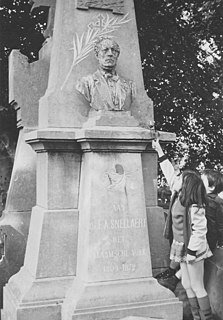
Ferdinand Augustijn Snellaert was a Flemish writer.

Julius Vuylsteke was a Belgian liberal politician and writer. He started his career as a lawyer, but later opened a bookshop. As a liberal Flemish politician, he founded the liberal association 't zal wel gaan, and he played an important role in the Flemish movement. Julius Vuylsteke promoted cultural cooperation of Flanders with the Netherlands. He became President of the Willemsfonds, and after his political career he gave his attention mainly to the history of Flanders. In 1867, he founded the Flemish weekly Het Volksbelang, which appeared for the first time on 12 January 1867. In 1867, Julius De Vigne was one of the editors together with Julius Sabbe, Jozef Van Hoorde, and Adolf Hoste.
The Masereelfonds, named after Frans Masereel, is a Flemish non-profit cultural organization, for the promotion and support of the Dutch language in Flanders. It is one of a family of five cultural organizations in Flanders, such as the Davidsfonds, Vermeylenfonds, Willemsfonds, and the Rodenbachfonds. Traditionally it was related to the Belgian communist party, but nowadays it is a progressive cultural organization.

Frans de Potter was a Belgian writer.
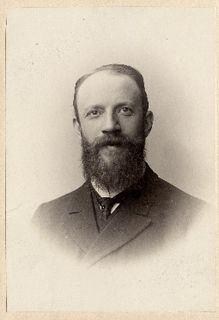
Louis Marie François Franck was a Belgian lawyer and liberal politician.
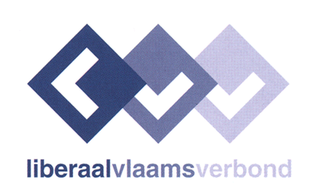
The Liberaal Vlaams Verbond was founded in 1913. From its origin it wanted to promote the Flemish cause and drew attention to social matters, within the Belgian Liberal Party. Together with the Willemsfonds and the Liberaal Vlaams Studentenverbond, it is one of the Flemish liberal organizations.

Frans Van Cauwelaert, was a Belgian Roman Catholic politician and lawyer.

Paul Fredericq was a Belgian historian at Ghent University active in the promotion of the use of the Dutch language in Belgium.
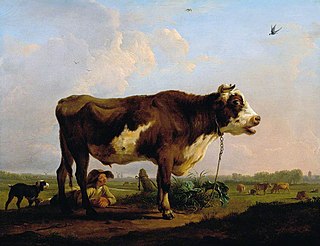
Balthasar Paul Ommeganck (1755–1826) was a Flemish painter of landscapes and animals active in Antwerp. Through his work and his role as an art teacher and founder of art institutions he gave an important impetus to the revitalization of landscape painting in the Low Countries.

Pieter Faes or Peeter Faes was a Flemish painter of still lifes of flowers and fruit. He worked in a decorative style close to that of Jan van Huysum.
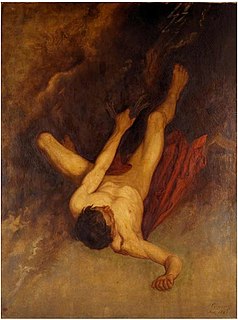
Adolphe Pierre Sunaert, Adolphe Sunaert or Adolf Sunaert was a Belgian painter, printmaker, teacher and author. He played a role in the organization and conservation of the art collections of the city of Ghent.
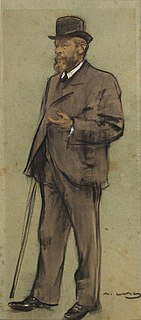
Albrecht Frans Lieven De Vriendt or Albrecht De Vriendt was a Belgian painter known for his genre scenes, history paintings, interiors and figure paintings. He was also active as an author, publisher and copyist He was also a watercolorist and an etcher. He participated in the monumentalist movement in Belgium and continued the tradition of the Belgian Romantic-historical school long after it had been abandoned in his country and abroad. He was the brother of the painter Juliaan De Vriendt with whom he often collaborated on decorative projects. He was a director of the Royal Academy of Fine Arts of Antwerp.